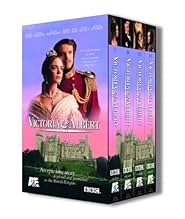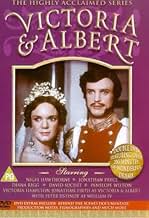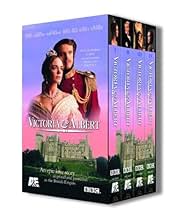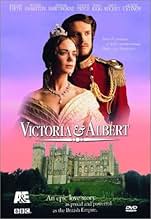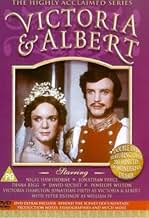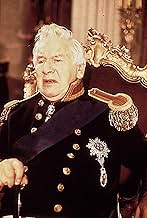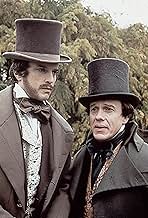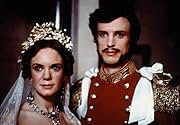Victoria & Albert
- Miniserie
- 2001
- 3 Std. 20 Min.
IMDb-BEWERTUNG
7,4/10
1087
IHRE BEWERTUNG
Die leidenschaftliche Liebesgeschichte der langen Ehe von Königin Victoria und Prinz Albert.Die leidenschaftliche Liebesgeschichte der langen Ehe von Königin Victoria und Prinz Albert.Die leidenschaftliche Liebesgeschichte der langen Ehe von Königin Victoria und Prinz Albert.
- 1 Primetime Emmy gewonnen
- 1 Gewinn & 3 Nominierungen insgesamt
Folgen durchsuchen
Empfohlene Bewertungen
Since the days gradually came on the Royal Family in Great Britain that they are to reign rather than rule, the struggle has always been to be popular and stay popular without being self indulgent. They are the unifying symbol for their country rather than a written Constitution that we Yanks have, so they're behavior, good or bad, counts for so much more.
The folks who established that tradition were Victoria & Albert, first cousins in the Saxe-Coburg family and husband and wife. Through her father, the Duke of Kent, young Victoria was the heir to the British monarchy to which she ascended in 1837.
Royalty made its last gasp for power immediately preceding the events that are shown in this mini-series. King William IV played here by Peter Ustinov by royal prerogative dismissed the government of Prime Minster Earl Grey. Robert Peel formed a Tory government, but it only lasted for a few months because Parliament by now had firm control of the Treasury. William IV was forced to call back Earl Grey and bow to the wishes of the people's representatives, now even more representative since the Reform Act of 1832 reapportioned Parliament after several hundred years.
So the monarchy was to reign instead of rule, but if this bunch didn't keep a lid on the peccadilloes, the folks in the United Kingdom might just take it in their heads to be rid of them and get themselves a republic like their former colonies had done. That was the duty that Prince Albert (Jonathan Firth) saw it and he persuaded his young bride, Queen Victoria (Victoria Hamilton) that they must do the same.
Albert was a serious young man and Victoria had been leading a sheltered life courtesy of her mother Penelope Wilton had led a life away from the dissolute Hanoverian Court of Uncles George IV and William IV.
When you have no other purpose in life, but to set an example, you'd better be good at that. A few in the Royal Family haven't lived up to that down to this day. If you can't be good, at least be discreet.
Victoria & Albert is a good mini-series from the BBC capturing the ambiance of the early Victorian era very well indeed. Diana Rigg won an Emmy for her performance as Baroness Lehzen, young Victoria's governess who didn't quite know when to let go.
You can enjoy it even if you're not familiar with British history.
The folks who established that tradition were Victoria & Albert, first cousins in the Saxe-Coburg family and husband and wife. Through her father, the Duke of Kent, young Victoria was the heir to the British monarchy to which she ascended in 1837.
Royalty made its last gasp for power immediately preceding the events that are shown in this mini-series. King William IV played here by Peter Ustinov by royal prerogative dismissed the government of Prime Minster Earl Grey. Robert Peel formed a Tory government, but it only lasted for a few months because Parliament by now had firm control of the Treasury. William IV was forced to call back Earl Grey and bow to the wishes of the people's representatives, now even more representative since the Reform Act of 1832 reapportioned Parliament after several hundred years.
So the monarchy was to reign instead of rule, but if this bunch didn't keep a lid on the peccadilloes, the folks in the United Kingdom might just take it in their heads to be rid of them and get themselves a republic like their former colonies had done. That was the duty that Prince Albert (Jonathan Firth) saw it and he persuaded his young bride, Queen Victoria (Victoria Hamilton) that they must do the same.
Albert was a serious young man and Victoria had been leading a sheltered life courtesy of her mother Penelope Wilton had led a life away from the dissolute Hanoverian Court of Uncles George IV and William IV.
When you have no other purpose in life, but to set an example, you'd better be good at that. A few in the Royal Family haven't lived up to that down to this day. If you can't be good, at least be discreet.
Victoria & Albert is a good mini-series from the BBC capturing the ambiance of the early Victorian era very well indeed. Diana Rigg won an Emmy for her performance as Baroness Lehzen, young Victoria's governess who didn't quite know when to let go.
You can enjoy it even if you're not familiar with British history.
10dewey22
Few movies are made that are so flawless. Perfect in: casting, directing, editing, content, costumes, and background music. All performances are believable and the diction is as clear as if it were an American made movie. The main character "Victoria" is played by Victoria Hamilton whose ability to express feelings without speaking is Oscar winning quality plus.
Jonathon, Colin's younger brother, plays the best Albert that I have ever seen in my entire life. If you love period films, such as Sense and Sensibility, Pride and Prejudice, and Mansfield Park, you will LOVE this film. Victoria Hamilton, from Mansfield Park, made me honestly respect her as a great actress. She brought me to tears by the end of this amazing miniseries!
God, the Brits are good at this sort of thing! A 180-minute history lesson presented as a story of true love. Or maybe it's the other way round. Anyway the whole thing spins along at a merry pace, especially the first half with the intrigue surrounding Victoria's ascent to the throne and her marriage to Albert. Victoria Hamilton and Jonathan Firth really convince as V & A, as does Penelope Wilton as Victoria's domineering mother. We get the usual lashings of fine supporting performances from Nigel Hawthorne (Melbourne), John Wood (Wellington), Alex McCowen (Peel), Peter Ustinov (William IV), Delena Kidd (Queen Adelaide), Diana Rigg (Baroness Lentzen) etc etc. In fact the Baroness was just about the only character in the cast that doesn't have a piece of Australia named after them. As far as I know the only one of them that actually made it out here was Victoria's younger son Prince Alfie who was shot at by some deranged person in Mosman circa 1869. The leading teaching hospital in Sydney is named after him (how's that for trivia?)
Yes, the historical record is played around with a bit my sources have Baroness Lentzen (Victoria's governess) being given her matching orders in 1842, not 1840, and Albert didn't actually save Victoria from assassination at the hands of an Irish lunatic, though his progressive views on insanity as a defence to crime may have helped to save some of the insane from the hangman (US politicians take note). However, it was probably from Albert that Victoria got her Victorian morality, and he certainly was of great influence some say he was virtually King while he was alive, at least behind the scenes. As a German he had to keep a low profile in xenophobic Britain, but he gets the credit for the success of the Great Exhibition of 1851; even if Paxton (Richard Briers) actually designed the glass and cast iron `Crystal Palace' in which it was held, Albert had the sense to see that, flimsy as it seemed, Paxton's design was an ideal solution.
It is also sometimes forgotten that Victoria and Albert started out married life when barely out of their teenage years. Both were strongly influenced by older and more experienced people yet both managed to break free. While Albert may have been the better organised and disciplined of the two, Victoria had a remarkable determination to succeed at a particularly tough job. By the end of her long reign the British monarchy had been quietly transformed.
The voluminous correspondence of both parties (the Victorians seem to have written everything down) certainly suggest that Victoria was crazy about Albert, her first cousin, almost from the start, and that Albert, not so keen on Victoria to start with despite the dynastic advantages, grew to love her deeply. This is beautifully laid out in the film, and amongst all the splendour there is a remarkable intimacy. Someone (Melbourne?) suggests at one stage that Albert, through his influence over Victoria, had saved the British monarchy `for another 100 years.' Clearly, he is needed now. Somehow one cannot imagine an equally uplifting account of the present Queen and her consort being made, either now or in another 100 years.
Yes, the historical record is played around with a bit my sources have Baroness Lentzen (Victoria's governess) being given her matching orders in 1842, not 1840, and Albert didn't actually save Victoria from assassination at the hands of an Irish lunatic, though his progressive views on insanity as a defence to crime may have helped to save some of the insane from the hangman (US politicians take note). However, it was probably from Albert that Victoria got her Victorian morality, and he certainly was of great influence some say he was virtually King while he was alive, at least behind the scenes. As a German he had to keep a low profile in xenophobic Britain, but he gets the credit for the success of the Great Exhibition of 1851; even if Paxton (Richard Briers) actually designed the glass and cast iron `Crystal Palace' in which it was held, Albert had the sense to see that, flimsy as it seemed, Paxton's design was an ideal solution.
It is also sometimes forgotten that Victoria and Albert started out married life when barely out of their teenage years. Both were strongly influenced by older and more experienced people yet both managed to break free. While Albert may have been the better organised and disciplined of the two, Victoria had a remarkable determination to succeed at a particularly tough job. By the end of her long reign the British monarchy had been quietly transformed.
The voluminous correspondence of both parties (the Victorians seem to have written everything down) certainly suggest that Victoria was crazy about Albert, her first cousin, almost from the start, and that Albert, not so keen on Victoria to start with despite the dynastic advantages, grew to love her deeply. This is beautifully laid out in the film, and amongst all the splendour there is a remarkable intimacy. Someone (Melbourne?) suggests at one stage that Albert, through his influence over Victoria, had saved the British monarchy `for another 100 years.' Clearly, he is needed now. Somehow one cannot imagine an equally uplifting account of the present Queen and her consort being made, either now or in another 100 years.
I must admit I really enjoyed 'Victoria and Albert'. It was excellent. My only criticism of the film was it could have been a couple of episodes longer as it left out so many other possibilities rushing to reach its conclusion. Jonathon Firth was really very good as Prince Albert and Victoria Hamilton made a good job at Queen Victoria. I particularly liked Dame Diana Rigg as Baroness Lehzen and Penelope Wilton as the Duchess of Kent. Sir Peter Ustinov was marvellous as King William IV. Patrick Malahide was so completely odious as Sir John Conroy. I also found Nigel Hawthorne brilliant as Viscount Melbourne. Rachel Pickup was really very good as Lady Henrietta Standish and David Suchet was great as Baron Stockmar. Jonathon Pryce was adequate as King Leopold I. Elizabeth Spriggs was delightful in a cameo role in 'The Rivals'. I would really recommend this.
Wusstest du schon
- WissenswertesNigel Hawthorne (Lord William Lamb, 2nd Viscount Melbourne) previously played Queen Victoria's grandfather King George III in King George - Ein Königreich für mehr Verstand (1994).
- PatzerAt a state occasion prior to Victoria's marriage the orchestra is playing music from Strauss's operetta 'Die Fledermaus' which would not be written until many years later in 1874.
- Zitate
Prince Albert: [Victoria bangs on Albert's study door] Who is it?
Victoria: [In a loud annoyed voice] What do you mean? "Who is it?" It's your queen!
Prince Albert: [Victoria takes a deep breath and calms down a bit knocks on the door calmly] Who is it?
Victoria: [In a calm and quiet voice] It's your wife.
[Albert opens the door and Victoria goes in and closes the door quietly]
- VerbindungenVersion of Königin Viktoria (1937)
- SoundtracksZadok the Priest
George Frideric Handel (as Georg Friedrich Händel)
Top-Auswahl
Melde dich zum Bewerten an und greife auf die Watchlist für personalisierte Empfehlungen zu.
- How many seasons does Victoria & Albert have?Powered by Alexa
Details
- Erscheinungsdatum
- Herkunftsländer
- Sprache
- Auch bekannt als
- Victoria & Albert - Eine Liebe im Schatten der Macht
- Drehorte
- Produktionsfirmen
- Weitere beteiligte Unternehmen bei IMDbPro anzeigen
- Laufzeit
- 3 Std. 20 Min.(200 min)
- Farbe
- Sound-Mix
- Seitenverhältnis
- 1.33 : 1
Zu dieser Seite beitragen
Bearbeitung vorschlagen oder fehlenden Inhalt hinzufügen



